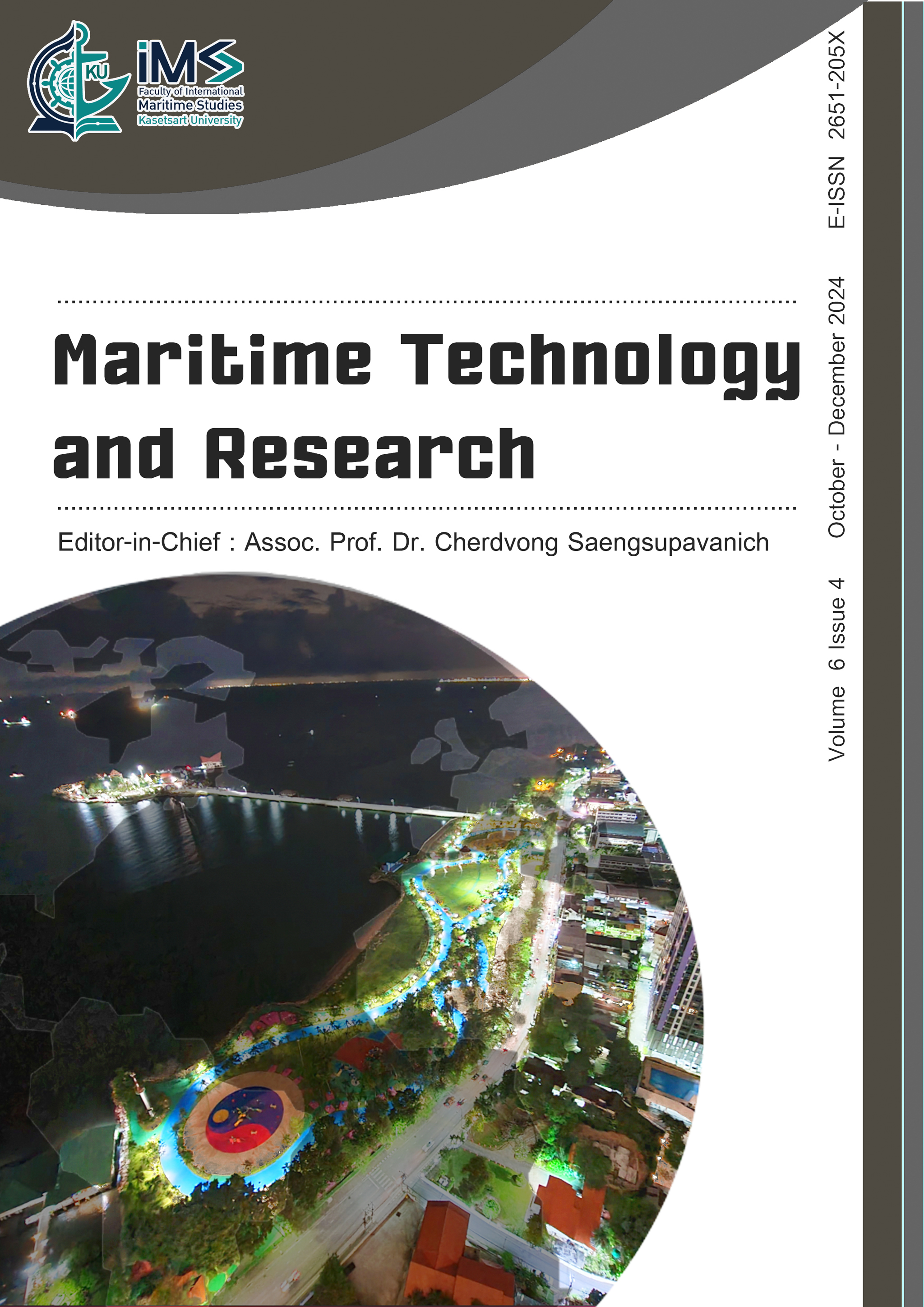Employability skills of maintenance technicians in container ports: Implications for maritime technical and vocational education and training
DOI:
https://doi.org/10.33175/mtr.2024.269909Keywords:
Container ports, Employability skills, Maritime education and training, Technical and vocational education and trainingAbstract
The study investigated the employability skills of maintenance technicians engaged in container ports in Sri Lanka. The specific objectives were to investigate 1) employability skill gaps between technicians’ evaluations of the level of current possession and the expected level to be possessed for the current job tasks, 2) employability skill gaps between technicians’ evaluations of the expected level of skills for current job tasks and immediate superiors’ evaluation of the importance of the same for current tasks, and 3) maintenance technicians’ exposure to skill development strategies after joining the respective container port terminals. The study was conducted in the two main container ports of Sri Lanka- Colombo and Hambantota. Responses were pooled from two independent sample groups- maintenance technicians and their immediate superiors. Maintenance technicians had graduated from technical and vocational education and training institutions with levels 3 or 4 National Vocational Qualification. Findings identified employability skill preferences of maintenance technicians and their immediate superiors, which led to possible skill gaps. The findings highlight the importance of TVET institutions identifying the preferences of business sectors, they should be prepared to impart employer-preferred skills to their trainees and to bridge any gaps in expectations. This will lead employees to develop realistic expectations of employer preferences. Hence, the findings of the study have implications for technical and vocational education and training institutions, students enrolled in these institutions, employees engaged in container ports, and their employers.
------------------------------------------------------------------------------
Cite this article:
APA Style:
Fernando, H., & Wickramasinghe, V. (2024). Employability skills of maintenance technicians in container ports: Implications for maritime technical and vocational education and training. Maritime Technology and Research, 6(4), 269909. https://doi.org/10.33175/mtr.2024.269909
MDPI Style:
Fernando, H.; Wickramasinghe, V. Employability skills of maintenance technicians in container ports: Implications for maritime technical and vocational education and training. Marit. Technol. Res. 2024, 6(4), 269909. https://doi.org/10.33175/mtr.2024.269909
Vancouver Style:
Fernando H, Wickramasinghe V. (2024). Employability skills of maintenance technicians in container ports: Implications for maritime technical and vocational education and training. Marit. Technol. Res. 6(4): 269909. https://doi.org/10.33175/mtr.2024.269909
------------------------------------------------------------------------------
Highlights
- Employability skills are vital to be employed and to remain employed
- Skill gaps have consequences for job seekers, employers, and training institutes
- This study investigated employability skills of technicians in container ports
References
Andrews, J., & Higson, H. (2008). Graduate employability, “soft skills” versus “hard” business knowledge: A European study. Higher Education in Europe, 33(4), 411-422. https://doi.org/10.1080/03797720802522627
Bakhshi, H., Downing, J. M., Osborne, M. A., & Schneider, P. (2017). The Future of Skills - employment in 2030. London: Pearson and Nesta. Retrieved from https://futureskills.pearson.com/research/assets/pdfs/technical-report.pdf
Brooks, R., & Everett, G. (2009). The predominance of work-based training in young graduates’ learning. Journal of Education of Work, 21(1), 61-73. https://doi.org/10.1080/13639080801956966
Byrom, T., & Aiken, V. (2014). Doing it differently: Re-designing the curriculum to face the challenges of student work-based learning opportunities. Higher Education, Skills and Work-based Learning, 4(3), 271-283. https://doi.org/10.1108/HESWBL-05-2014-0017
Collet, C., Hine, D., & du Plessis, K. (2015). Employability skills: Perspectives from a knowledge-intensive industry. Education + Training, 57(5), 532-559. https://doi.org/10.1108/ET-07-2014-0076
Detsimas, N., Coffey, V., Sadiqi, Z., & Li, M. (2016). Workplace training and generic and technical skill development in the Australian construction industry. Journal of Management Development, 35(4), 486-504. https://doi.org/10.1108/JMD-05-2015-0073
Employeepedia. (2023). Skills needed to be an equipment maintenance technician. Retrieved from https://www.employeepedia.com/hire/job-skills/8447-skills-needed-to-be-an-equipment-maintenance-technician
Fletcher-Brown, J., Knibbs, K., & Middleton, K. (2015). Developing “employability”: The 3Es case for live-client learning. Higher Education, Skills and Work-Based Learning, 5(2), 181-195. https://doi.org/10.1108/heswbl-05-2014-0011
Gibb, J., & Curtin, P. (2004). Overview. In Gibb, J. (Ed.). Generic skills in vocational education and training: Research readings (pp. 7-18). Adelaide. Australia: National Centre for Vocational Education Research. Retrieved from https://ncver.edu.au/__data/assets/file/0013/5143/nr2200.pdf
Hollister, J. M., Spears, L. I., Mardis, M. A., Lee, J., McClure, C. R., & Liebman, E. (2017). Employers’ perspectives on new information technology technicians’ employability in North Florida. Education + Training, 59(9), 929-945. https://doi.org/10.1108/ET-02-2017-0019
Islam, T., Ahmed, I., Khalifah, Z., Sadiq, M., & Faheem, M. A. (2015). Graduates’ expectation gap: The role of employers and higher learning institutes. Journal of Applied Research in Higher Education, 7(2), 372-384. https://doi.org/10.1108/JARHE-05-2014-0056
Jusoh, M., Simun, M., & Choy-Chong, S. (2011). Expectation gaps, job satisfaction, and organizational commitment of fresh graduates, Education + Training, 53(6), 515-530. https://doi.org/10.1108/00400911111159476
Kavirathna, C. A., Hanaoka, S., Kawasaki, T., & Shimada, T. (2021). Port development and competition between the Colombo and Hambantota ports in Sri Lanka. Case Studies on Transport Policy, 9(1), 200-211. https://doi.org/10.1016/j.cstp.2020.12.003
Lim, N. C. (2015). Towards an integrated academic assessment: Closing employers’ expectations? Education +Training, 57(2), 148-169. https://doi.org/10.1108/ET-08-2013-0102
Mahajan, R., Gupta, P., & Misra, R. (2022). Employability skills framework: A tripartite approach. Education + Training, 64(3), 360-379. https://doi.org/10.1108/ET-12-2020-0367
Marr, B. (2019). The 10 vital skills you will need for the future of work. Retrieved from https://www.forbes.com/sites/bernardmarr/2019/04/29/the-10-vital-skills-you-will-need-for-the-future-of-work/?sh=e332ac93f5bd
McGunagle, D., & Zizka, L. (2020). Employability skills for 21st-century STEM students: The employers' perspective. Higher Education, Skills, and Work-Based Learning, 10(3), 591-606. https://doi.org/10.1108/HESWBL-10-2019-0148
Ministry of Higher Education Malaysia. (2012). The national graduate employability blueprint 2012-2017. Putrajaya: Ministry of Education. Retrieved from https://masurimasooded770.files.wordpress.com/2014/03/national-graduate-employability-blueprint-2012-2017.pdf
Mulay, H. (2018). 15 Vital skills to make you employable in the future. Retrieved from https://www.linkedin.com/pulse/15-vital-skills-make-you-employable-future-dr-harshada-mulay
National Research Council. (2012). Education for life and work: Developing transferable knowledge and skills in the 21st century. Washington, DC: The National Academies Press. https://doi.org/10.17226/13398.
Ng, P. M. L., Chan, J. K. Y., Wut, T. M., Lo, M. F., & Szeto, I. (2021). What makes better career opportunities for young graduates? Examining acquired employability skills in higher education institutions. Education + Training, 63(6), 852-871. https://doi.org/10.1108/ET-08-2020-0231
Oresanya T. O., Omodewu O. S., Kolade T. T., & Fashedemi A. O. (2014). Vocational education and employability: The Nigerian Situation. Journal of Poverty, Investment and Development, 5, 158-160. https://core.ac.uk/download/pdf/234695112.pdf
Puwakgahawela, A., Mahakalanda, I., & Wickramasinghe, V. (2023). Employability skills of information technology graduates: A comparison of expectations, priorities, and strategies. In Proceedings of the Open University Research Sessions, The Open University of Sri Lanka. Sri Lanka.
Saunders, V., & Zuzel, K. (2010). Evaluating employability skills: Employer and student perceptions. Bioscience Education, 15(1), 1-15. https://doi.org/10.3108/beej.15.2
Scott, F. J., & Willison, D. (2021). Students’ reflections on an employability skills provision.
Journal of Further and Higher Education, 45(8), 1118-1133. https://doi.org/10.1080/0309877X.2021.1928025
Shah, M., Grebennikov, L., & Nair, C. S. (2015). A decade of study on employer feedback on the quality of university graduates. Quality Assurance in Education, 23(3), 262-278. https://doi.org/10.1108/QAE-04-2014-0018
Sri Lanka ICT Association. (2013). Rising demand: The increasing demand for IT workers spells a challenging opportunity for the IT industry‐national IT workforce survey. Colombo: Sri Lanka ICT Association.
Suarta, I. M., & Suwintana, I. K. (2020). The new framework of employability skills for digital business. Journal of Physics: Conference Series, 2020, 1833. https://doi.org/10.1088/1742-6596/1833/1/012034
Tertiary and Vocational Education Commission. (2016). National Skills Development Report 2016/2017. Colombo, Sri Lanka: Tertiary and Vocational Education Commission. Retrieved from https://www.parliament.lk/uploads/documents/paperspresented/annual-report-tertiary-and-vocational-education-commission-2016.pdf
The World Bank. (2023). The Container Port Performance Index 2022: A Comparable Assessment of Performance based on Vessel Time in Port. Washington, DC: The World Bank. Retrieved from https://documents.worldbank.org/en/publication/documents-reports/documentdetail/099051723134019182/p1758330d05f3607f09690076fedcf4e71a
Tomlinson, M. (2012). Graduate employability: A review of conceptual and empirical themes. Higher Education Policy, 25(4), 407-431. https://doi.org/10.1057/hep.2011.26
Tymon, A. (2013). The student perspective on employability. Studies in Higher Education, 38(6), 841-856. https://doi.org/10.1080/03075079.2011.604408
Wickramasinghe, V., & Perera, L. (2010). Graduates’, university lecturers’ and employers’ perceptions towards employability skills. Education +Training, 52(3), 226-244. https://doi.org/10.1108/00400911011037355
World Shipping Council. (2023). The top 50 container ports. Retrieved from https://www.worldshipping.org/top-50-ports
Downloads
Published
License
Copyright (c) 2024 Maritime Technology and Research

This work is licensed under a Creative Commons Attribution-NonCommercial-NoDerivatives 4.0 International License.
Copyright: CC BY-NC-ND 4.0








